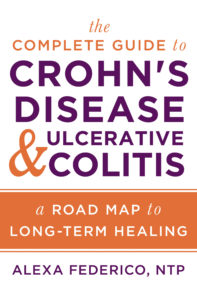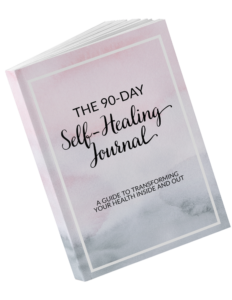Some links in this post are affiliate links. The commission generated from sales help to support this blog.
Flare-ups from Crohn’s disease (or ulcerative colitis) are what you want to prevent. My mission here to help you live a healthy and fulfilling life is to prevent flares so you don’t have to plan your life around a Crohn’s flare-up.
What is a flare-up?
Inflammatory Bowel Disease (IBD) can be in remission or be active. During remission, the Crohn’s or ulcerative colitis is “quiet,” and there are no signs of it. Since there is no single drug or lifestyle that has cured this disease yet, staying in remission is the ultimate goal.
In a Crohn’s flare-up a person becomes symptomatic. Generally, these are the same symptoms the person has experienced before. For example, joint pain is a common symptom for some people, but I on the other hand have only experienced it a couple of times when I was very sick. If I were in a serious flare I might have joint pain, but I don’t experience it daily or even if I have an “off” day. Flares can last days, weeks, or months.
This means that the signs and symptoms of a Crohn’s flare-up will vary from person to person. Usually the individual doesn’t feel well overall, is experiencing painful or at least having inconvenient symptoms. However, sometimes people may not feel any different but blood work and scopes reveal inflammation.
How do you get into a flare-up?
It’s common to go into a Crohn’s flare-up but not know why. Unfortunately, there is still a lot of discovering to be done on the mechanisms of autoimmune diseases, so there may be a time you feel the flare coming on but don’t realize the trigger.
Other times, you can pinpoint what spurred a flare, like:
- Over-training or pushing the body too hard physically
- Not getting enough sleep
- Stress – work, emotional, life
- Overconsumption of foods that don’t work for you
- Burdened by toxins in plastics, personal care, cleaning products, etc.
- Mold toxicity
- Not addressing leaky gut
There are more ways a Crohn’s flare-up can be triggered, but this is a solid list. Again, sometimes the trigger cannot be pinpointed but these are common factors in our lives.
How to prevent a Crohn’s flare-up
As I have said, it’s not always possible to prevent a Crohn’s flare-up. But, my perspective on things is to use all the tools in your power to fortify your body and the state of your health (the premise of my book). I also discuss 3 ways to prevent a flare-up in more detail in this article.
There are many ways to support your health that help to prevent flares.
- Eating right. This is different for everyone (and why it’s helpful to work with a practitioner!) But for sure cut out inflammatory oils, gluten, refined sugar, and commercially-made processed foods. Include probiotic-rich foods like yogurt (whatever type you tolerate), sauerkraut, and kimchi.
- Stay on top of nutritional deficiencies. It’s a good idea to get a simple blood test to keep track of the nutrients in your body. Your doctor can order this. If you are deficient or fall on the low end of any nutrient, my first piece of advice is to incorporate more foods that contain it (or spending more time outside, if vitamin D is needed). You may benefit from a high-quality supplement as well.
- Decrease the toxins. This includes a wide range of products from pesticides and GMO’s in food (buy organic), to make-up, shampoo, cleaning solutions, lotions, and more. I understand that sounds overwhelming, so start slow! You can begin by purchasing produce by using the “dirty dozen and clean 15” lists (Google that).
- Get enough sleep.
- Moderate your stress. If your job is taking a toll on your health, well, I am serious when I say reconsider where you work. If you really can’t at this time, you must incorporate things in your life to destress. Build time into your schedule to go for a 15 minute walk, start practicing medication (5-10 minutes a day, try an app), journal, or whatever else will help you to channel your stress away.
- Get exercise, but not too much. Overly intense training can trigger a Crohn’s flare-up in some people. Try walking, yoga, swimming, bicycling, etc.
- Test your home (and ideally your work environment, too) for mold. Doing everything “right” but living or working in a moldy environment can undermine your progress.
- If you are on a medication, don’t stop abruptly or without talking to your doctor.
How to Support Yourself in a Crohn’s Flare
- Invest in a heating pad. And by invest I mean shell out $10-20. If you sit at a desk at work, get two!
- Use air filters.
- Stay hydrated. I recommend adding trace mineral drops to water, especially if diarrhea is a symptom.
- Drink bone broth, homemade or a good-store-bought one.
- Rest, rest, rest!!!!
- Eat simple foods. During a Crohn’s flare your body is using a lot of energy. Keep foods SIMPLE and eat what you know is healthy for you as to make digestion as basic as possible. My safe foods include: broth, tea, white rice, meat, gluten free-pretzels or crackers, small amounts of cooked veggies, and some fruit.
- Ask for help. Seriously, don’t be a superhero now, accept support from friends and family.
- Don’t stretch yourself thin. This is where saying no to things you don’t have to do or don’t want to do, becomes important.
- Contact your practitioner (s) when appropriate, when things are too bad for you to handle, or if you just want to keep them in the loop.
Sometimes flares require medical attention. If you find yourself in that position, read “How to Make the Most of a Hospital Stay with Crohn’s or Colitis.“
This post is not an exhaustive way of how to support yourself before, during, and after a Crohn’s flare, so if you have other tips, please share them with us below!







